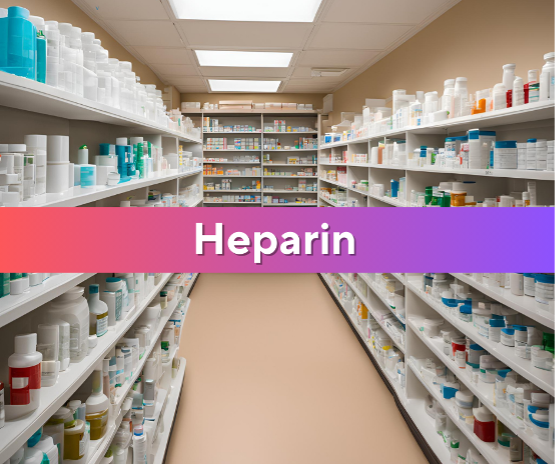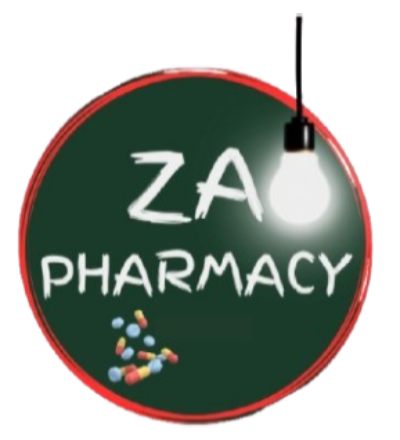Za Pharmacy
Drugs, Supplies and Delivery
Heparin
Heparin is a widely used anticoagulant that prevents and treats blood clots. It is a naturally occurring glycosaminoglycan that works by enhancing the activity of antithrombin III (ATIII), a natural inhibitor of clotting factors. Heparin is available in two main forms: unfractionated heparin (UFH) and low molecular weight heparin (LMWH). This article provides a detailed overview of heparin, including its mechanism of action, uses, dosage, side effects, precautions, drug interactions, and generic names, referencing authoritative sources such as the British National Formulary (BNF), Lippincott Textbook of Pharmacology, and Lange Basic & Clinical Pharmacology.
Heparin exerts its anticoagulant effect by binding to and enhancing the activity of antithrombin III (ATIII), a natural inhibitor of clotting factors. The mechanism of action involves:
- Inhibition of Thrombin and Factor Xa:
- Heparin binds to ATIII, causing a conformational change that enhances its ability to inactivate thrombin (factor IIa) and factor Xa.
- By inhibiting these clotting factors, heparin prevents the formation of blood clots.
- Rapid Onset of Action:
- Heparin has an immediate anticoagulant effect when administered intravenously (IV) or subcutaneously (SC).
- Short Half-Life:
- The anticoagulant effect of heparin is short-lived, with a half-life of approximately 1–2 hours for IV administration and 3–4 hours for SC administration.
Heparin is approved for the following conditions:
- Prevention and Treatment of Venous Thromboembolism (VTE):
- Used to prevent and treat deep vein thrombosis (DVT) and pulmonary embolism (PE).
- Acute Coronary Syndromes (ACS):
- Used in the management of unstable angina and non-ST-segment elevation myocardial infarction (NSTEMI) to prevent further thrombotic events.
- Prevention of Clotting in Extracorporeal Circuits:
- Used in patients undergoing hemodialysis, cardiopulmonary bypass, or extracorporeal membrane oxygenation (ECMO) to prevent clotting in the extracorporeal circuit.
- Disseminated Intravascular Coagulation (DIC):
- Used in some cases of DIC to prevent further clot formation and consumption of clotting factors.
The dosage of heparin varies depending on the indication, route of administration, and patient-specific factors. Below are general guidelines:
- Prevention of VTE:
- Subcutaneous (SC) Administration:
- Standard Dose: 5,000 units SC every 8–12 hours.
- Duration: Typically continued until the patient is ambulatory or the risk of VTE is reduced.
- Subcutaneous (SC) Administration:
- Treatment of VTE:
- Intravenous (IV) Administration:
- Initial Bolus: 80 units/kg IV, followed by a continuous infusion of 18 units/kg/hour.
- Monitoring: Adjust the infusion rate based on the activated partial thromboplastin time (aPTT), typically targeting an aPTT ratio of 1.5–2.5 times the control value.
- Intravenous (IV) Administration:
- Acute Coronary Syndromes (ACS):
- IV Administration:
- Initial Bolus: 60–70 units/kg IV (maximum 5,000 units), followed by a continuous infusion of 12–15 units/kg/hour.
- Monitoring: Adjust the infusion rate based on the aPTT.
- IV Administration:
- Special Populations:
- Renal Impairment: Use with caution in patients with severe renal impairment. LMWH may be preferred in these patients.
Elderly: No dose adjustment is required unless renal function is impaired
Heparin is generally well-tolerated, but some side effects may occur. These include:
- Common Side Effects:
- Bleeding (e.g., hematoma at the injection site, nosebleeds)
- Injection site reactions (e.g., pain, redness, swelling)
- Thrombocytopenia (low platelet count)
- Less Common Side Effects:
- Hypersensitivity reactions (e.g., rash, itching)
- Elevated liver enzymes
- Rare but Serious Side Effects:
- Major Bleeding: Gastrointestinal bleeding, intracranial hemorrhage.
- Heparin-Induced Thrombocytopenia (HIT): A severe immune-mediated reaction that can lead to thrombosis.
- Osteoporosis: With long-term use, especially in high doses.
- Contraindications:
- Hypersensitivity to heparin or pork products.
- Active clinically significant bleeding.
- History of heparin-induced thrombocytopenia (HIT).
- Warnings:
- Bleeding Risk: Heparin increases the risk of bleeding. Use with caution in patients with a history of bleeding disorders or conditions that predispose to bleeding.
- HIT: Monitor platelet counts regularly to detect HIT, especially in patients receiving heparin for more than 5 days.
- Pregnancy and Lactation: Heparin is generally considered safe during pregnancy and breastfeeding, as it does not cross the placenta or enter breast milk.
- Monitoring:
- Regular monitoring of aPTT for patients receiving IV heparin.
- Regular platelet counts to detect HIT.
- Watch for signs of bleeding (e.g., unusual bruising, blood in stool or urine).
Heparin interacts with several medications, including:
- Other Anticoagulants (e.g., warfarin, dabigatran): Increased risk of bleeding.
- Antiplatelet Agents (e.g., aspirin, clopidogrel): Increased risk of bleeding.
- NSAIDs (e.g., ibuprofen): Increased risk of gastrointestinal bleeding.
- Thrombolytics (e.g., alteplase): Increased risk of bleeding.
Heparin is available under its generic name as well as brand names. Some common formulations include:
- Generic Name: Heparin sodium
- Brand Names: Heparin (commonly used worldwide), and others depending on the region.

